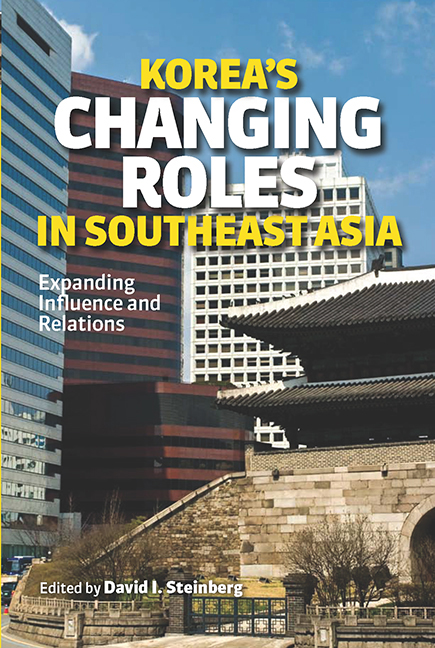Book contents
- Frontmatter
- Contents
- List of Tables, Figures and Photos
- Foreword
- Message
- Acknowledgements
- The Contributors
- 1 Tenuous Beginnings, Vigorous Developments
- 2 Perspectives on Korea's Role in ASEAN
- 3 South Korea and Southeast Asia: Ideas for Deepening the Partnership
- 4 Divergence Amidst Convergence: Assessing Southeast and Northeast Asian Security Dynamics
- 5 Korea's Economic Relations with Southeast Asia
- 6 Investment of Korean Electronics Industry in Southeast Asia
- 7 Korean Assistance to Southeast Asia
- 8 Korean Development Model: Lessons for Southeast Asia
- 9 Southeast Asian Migrant Workers in South Korea
- 10 Filipina Wives and “Multicultural” Families in Korea
- 11 A Fading Wave, Sinking Tide? A Southeast Asian Perspective on the Korean Wave
- 12 The Korean Wave: Korea's Soft Power in Southeast Asia
- 13 The Republic of Korea in Southeast Asia: Expanding Influences and Relations
- 14 Korea's Preparation for Southeast Asia: Research and Education on Southeast Asian Studies in Korea
- 15 Conclusion
- Index
2 - Perspectives on Korea's Role in ASEAN
Published online by Cambridge University Press: 21 October 2015
- Frontmatter
- Contents
- List of Tables, Figures and Photos
- Foreword
- Message
- Acknowledgements
- The Contributors
- 1 Tenuous Beginnings, Vigorous Developments
- 2 Perspectives on Korea's Role in ASEAN
- 3 South Korea and Southeast Asia: Ideas for Deepening the Partnership
- 4 Divergence Amidst Convergence: Assessing Southeast and Northeast Asian Security Dynamics
- 5 Korea's Economic Relations with Southeast Asia
- 6 Investment of Korean Electronics Industry in Southeast Asia
- 7 Korean Assistance to Southeast Asia
- 8 Korean Development Model: Lessons for Southeast Asia
- 9 Southeast Asian Migrant Workers in South Korea
- 10 Filipina Wives and “Multicultural” Families in Korea
- 11 A Fading Wave, Sinking Tide? A Southeast Asian Perspective on the Korean Wave
- 12 The Korean Wave: Korea's Soft Power in Southeast Asia
- 13 The Republic of Korea in Southeast Asia: Expanding Influences and Relations
- 14 Korea's Preparation for Southeast Asia: Research and Education on Southeast Asian Studies in Korea
- 15 Conclusion
- Index
Summary
Thank you very much, Prime Minister Lee Hong-Koo. I am surprised that you remember all those things that I have done. Even I forget them sometimes. Good morning, Dr Reed, the representative of The Asia Foundation here in Korea, and Professor Kim Woo-sang of the Institute of East and West Studies, Yonsei University.
Certainly, thank you very much, Vice Minister Kwon Jong-rak of Ministry of Foreign Affairs and Trade, the Republic of Korea. Distinguished guests, Excellencies, ladies and gentlemen, it is, indeed, a great privilege for me to be in Seoul as the Secretary-General of ASEAN, and it is my first visit here in this capacity.
Korea is a very, very important Dialogue Partner, one of the three in the ASEAN+3, which is a very unique group of countries and peoples who have decided to come together as a result of the financial crisis back in 1997. Former Prime Minister Lee introduced me as taking the helm of the Foreign Ministry in late 1997, but I do not want you to have the wrong impression that I engineered the financial crisis. We came into government as a result of the crisis because the previous government who caused it gave up. But we realized from that crisis, which occurred in early July 1997, that really we were more integrated, we were more connected than we realized, than we were aware of. Because it first occurred in Bangkok. The next day it was Malaysia. The next week it was Indonesia, and the next week it was the Philippines and not very long after that it was South Korea.
Japan was large enough to absorb the impact. China was big enough to sustain the blow. But South Korea was very much affected. So a sense of community really emerged then. It was the first time that Former Prime Minister Mahathir called a meeting of his initiative. If you recall, this was the EAEC [East Asia Economic Community], which had been opposed quite actively by other powers outside the region.
- Type
- Chapter
- Information
- Korea's Changing Roles in Southeast AsiaExpanding Influence and Relations, pp. 24 - 30Publisher: ISEAS–Yusof Ishak InstitutePrint publication year: 2010

